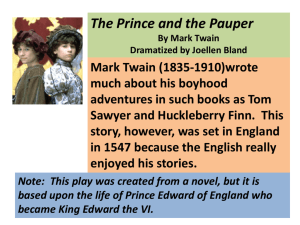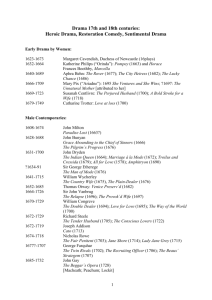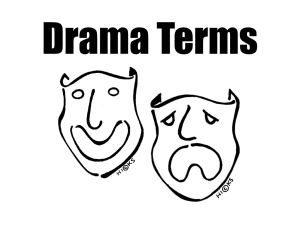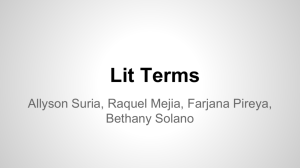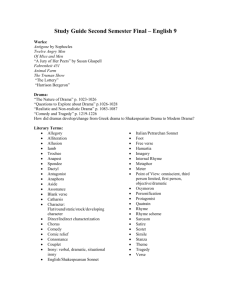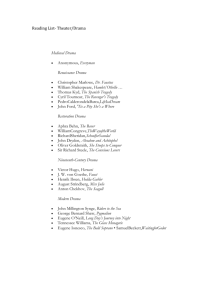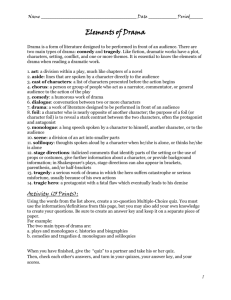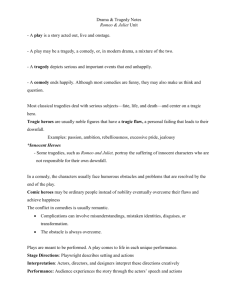File
advertisement
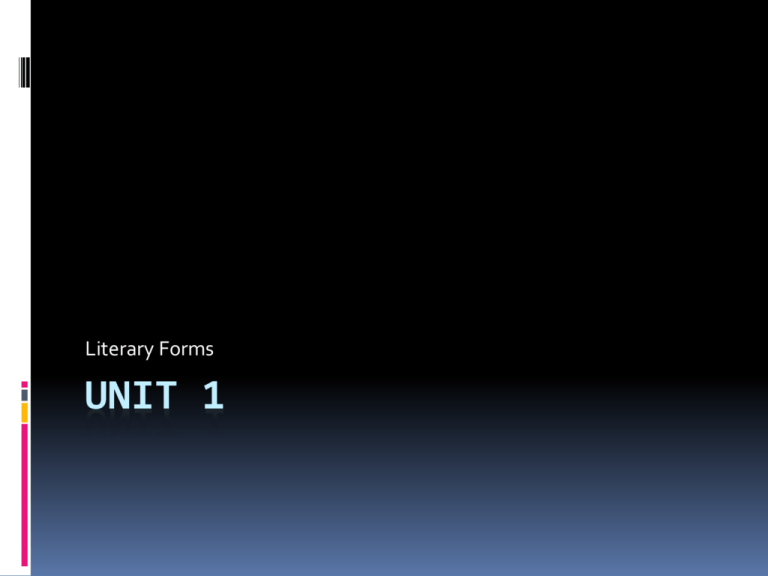
Literary Forms UNIT 1 Literary Forms Overview Imaginative literature may be divided into three major literary forms: Poetry Fiction Drama Poetry Poetry is usually categorized into three main types: Epic Dramatic Lyric All three subcategories share common traits such as specific patterns of rhythm and syntax, the frequent use of figurative language, and emphasis on the effects of the arrangement of the words on the page. Fiction Fiction is generally any narrative (story) about invented characters and events. May be in verse or prose. Major genres of fiction include: Novel Short story Novella Drama Drama does not typically contain a narrator and is usually intended for performance. Types of drama include: Comedy Romantic comedy Tragedy Classical tragedy Tragicomedy Drama Drama: comes from the Greek verb for “to do” or “to act” Playwright: the maker of the play Meant to be performed Closet drama: intended to be read rather than performed. Comedy In comedy, the tone for the most part is light The main effects are to engage the audience, the situations and characters tend to be drawn from ordinary life. Resolution is happy (at least for the major characters) Many traditional comic plots end with the marriage of one or more couples Types of Comedy High comedy: Depends primarily on verbal wit among sophisticated, clever characters. Appeals to the tastes of a cultivated audience. Low comedy: Characterized by physical humor, such as slapstick and obvious pranks. Fast-paced action, split-second timing of key exits and entrances, ridiculous caricatures, broad and often crass verbal humor Farce More Comedy Romantic comedy Center on a love affair between a beautiful and resourceful maiden, often in a male disguise, and a worthy suitor, who must overcome social and personal obstacles to arrive at a joyous resolution. Comedy of manners Also depicts young lovers, but the tone is more sophisticated and cynical; the outlook is more worldly Tragedy Tragedy Serious tone Somber The effect is to involve and strongly motivate the audience The outcome is disastrous for the protagonist, and often for those associated with him or her. Resolution usually involves one or more deaths Types of Tragedy Classical tragedy Center on a highborn tragic hero who commits an irreversible error of judgment Hubris: excess pride Senecan tragedy Inspired the development of revenge tragedy Full of sensational elements such as ghosts, grisly murders, nefarious schemes, and ruthless villains. Last Tragedy Domestic tragedy Emerged from the rise of the middle class in the 18th century. Protagonist’s origins are not noble or aristocratic but humble. Preoccupations are not with lofty, noble causes but with mundane issues, such as financial debt and marital strife. Tragicomedy Fall in the middle of the tragic/comic spectrum. Focus on both high and low characters and situations Bring a potentially tragic plot to a happy resolution (at least for the protagonist) through a sudden reversal of fortune or the reformation of the protagonist’s opponent. Also called “dark comedies” or “problem comedies” Theater of the Absurd Prominent in the 20th century Questions the meaning of life in a universe seen as godless. Ignores dramatic conventions such as having a well-established setting, logical dialogue, and a fully resolved conflict. Periods of Drama Ancient Greek drama Major playwrights were Aeschylus, Sophocles, and Euripides in tragedy. Major playwrights were Menander and Aristophanes in comedy Periods of Drama Roman drama Seneca was the chief tragedian Plautus and Terence were the major comic dramatists English Medieval drama Divided into morality plays Allegories that depicted abstractions of human qualities, usually engaged in a struggle for the soul’s salvation And mystery plays Designed to illustrate narratives from the Old and New Testaments; Authors are anonymous. Periods of Drama Elizabethan and Jacobean Major authors were William Shakespeare, Christopher Marlowe, John Webster, and Ben Jonson. Restoration and Eighteenth century Major authors included John Dryden, William Congreve, Richard Brinsley Sheridan Modern Drama Ibsen, Chekhov, Wilde, Shaw, Beckett, O’Neill, Miller, Pinter, Stoppard… Homework Find an example of each type of play (comedy— high, low, farce, romantic, manners; tragedy— classical, senecan, revenge, domestic; tragicomedy; theater of the absurd) Write the play’s title, author, and a brief explanation of why the play falls into each category Find an example of a play for each period of drama (ancient Greek, Roman, English medieval, Elizabethan and Jacobean, Restoration and Eighteenth century, and Modern) DUE FRIDAY
